高考英语书面表达Notice之书面通知与口头通知【精选】
高考英语作文-通知 NOTICE
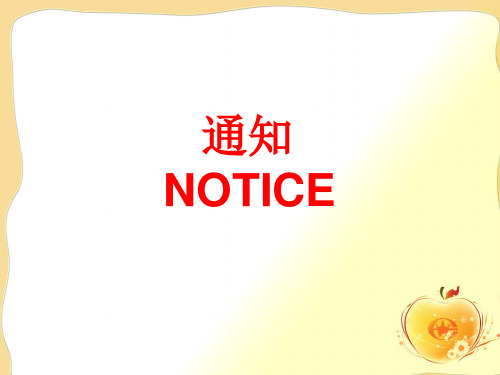
书面通知的格式:
1 )标题:在正文上面正中的地方写上 NOTICE . 2 )正文:包括具体的时间、地点、活动内容和注意 事项。 3 )单位:发通知的单位一般写在正文的右下角。有 时也放于标题之上,起强调作用。 4 )时间:一般写在左下角。
书面通知语言比较规范,切忌使模糊语言和俚语、 俗语。通知中常用第三人称,且被动语态使用较多。
书面通知模板:
NOTICE In order to help us deal with emergencies and save ourselves
a lecture will be held ________________________(时间、 地点). The lecture is mainly about ___________________ (具体内容). It will be given by ______________(谁做讲座).
将作延期。同学们周六早晨照常到校上课,周六下午停 课。如果天气允许的话,运动会将在下周六早晨举行。 学校乒乓球队的队员们请本周六下午4:30到乒乓球大 厅受训。武汉的乒乓球健将们将为你们做专门指导。
校体育办公室 2019年9月10日
NOTICE The sports meeting held this Saturday has to be put off because of the heavy rain. All students are required to come to school on Saturday morning as usual, but there will be no class that afternoon. Weather permitting, the sports meeting will be held next Saturday morning. Members of the school ping-pong team must come to the Ping-pong Hall at 4:30 this Saturday afternoon. Ping-pong stars from Wuhan will come and give special training then.
书面表达:口头通知与书面通知
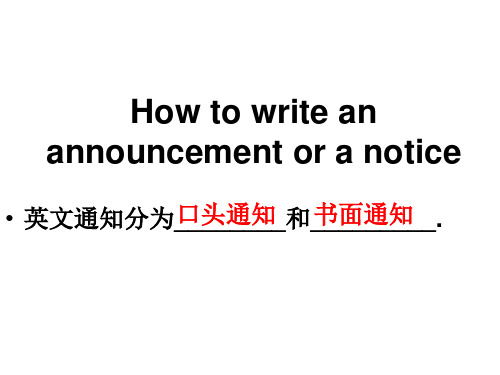
广播稿
广播稿
Boys and girls, May I have your attention, please? At the end of 2004, a strong earthquake hit the west part of Indonesia, which brought on a terrible tsunami to some areas of western Asia. This disaster has caused millions of deaths and destroyed many beautiful cities. How terrible things are! Besides, millions more who have become homeless are in great need of help now.
At present many countries all over the world including China have sent rescue teams there and thousands of people in every corner of the world are donating money to show their concern for them. It is true that many natural disasters can’t be avoided sometimes. But at least we can do something to help the people in the tsunami-hit areas. So let’s offer our pocket money to them! Thank you.
高中英语真题-口头通知与书面通知

口头通知与书面通知通知是告知人们参加活动的一种应用文。
语言需简明扼要,讲清楚何人、何时、何地参加什么活动和注意事项即可。
通知可分口头通知和书面通知两种。
口头通知的开头往往有称呼语(被通知的对象),如:“Boys and girls”,“Ladies and gentlemen”等,或用提醒听众注意的语句,如“Your attention, please!”,“May I have your attention, please?”等,且最好有结束语,如:“Thank you(for listening)!”以示礼貌。
范例:Attention, please! 24 students from will come to visit our scho ol on July 25. They will arrive at 8.00 in the morning. We are t o gather at 7.50 in the meeting room to give them a warm wel come, and then we’ll hold a get-together. After that, we’ll show them around our school. And we’ll have lunch together in the school dining hall. In the after noon some of the Canadian students will talk to us about their school. They will leave at 5.00 p.m. We should be polite and f riendly to our guests.That’s all. Thank you.书面通知通常上方正中写Notice或NOTICE。
正文部分开门见山,直接点出主题。
高考英语写作如何写好英语通知讲义
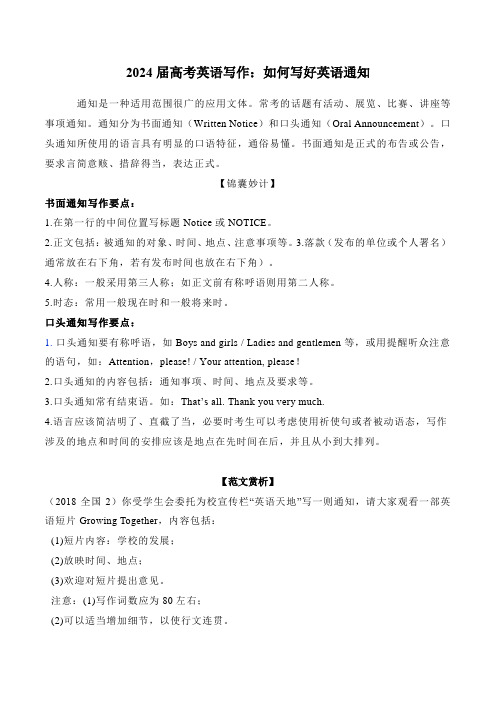
2024届高考英语写作:如何写好英语通知通知是一种适用范围很广的应用文体。
常考的话题有活动、展览、比赛、讲座等事项通知。
通知分为书面通知(Written Notice)和口头通知(Oral Announcement)。
口头通知所使用的语言具有明显的口语特征,通俗易懂。
书面通知是正式的布告或公告,要求言简意赅、措辞得当,表达正式。
【锦囊妙计】书面通知写作要点:1.在第一行的中间位置写标题Notice或NOTICE。
2.正文包括:被通知的对象、时间、地点、注意事项等。
3.落款(发布的单位或个人署名)通常放在右下角,若有发布时间也放在右下角)。
4.人称:一般采用第三人称;如正文前有称呼语则用第二人称。
5.时态:常用一般现在时和一般将来时。
口头通知写作要点:1. 口头通知要有称呼语,如Boys and girls / Ladies and gentlemen等,或用提醒听众注意的语句,如:Attention,please! / Your attention, please!2.口头通知的内容包括:通知事项、时间、地点及要求等。
3.口头通知常有结束语。
如:That’s all. Thank you very much.4.语言应该简洁明了、直截了当,必要时考生可以考虑使用祈使句或者被动语态,写作涉及的地点和时间的安排应该是地点在先时间在后,并且从小到大排列。
【范文赏析】(2018全国2)你受学生会委托为校宣传栏“英语天地”写一则通知,请大家观看一部英语短片Growing Together,内容包括:(1)短片内容:学校的发展;(2)放映时间、地点;(3)欢迎对短片提出意见。
注意:(1)写作词数应为80左右;(2)可以适当增加细节,以使行文连贯。
NoticeIn order to have a better understanding of our school, an outstanding English short movie about our school will be shown in the library from 2:30 to 4:00 in the afternoon on June 9th. It is organized by the Student Union. Here are some relevant details about it.To begin with, the name of the movie is Growing Together, which is about the development of our beloved school. As we all expect, it will be not only meaningful but also interesting. What’s more, everyone of you will be wele to take part (participate) in it, enjoying the movie, having a heated discussion afterwards and giving your own ments.The Student UnionJune 8, 2018【常用词汇】1.be present ( at) 出席2. be absent from…缺席……3. express one’s opinion表达某人的观点4. choose sb…as…选择某人作为……5. attend a lecture/meeting听课/参会6. give a lecture/speech 做讲座/演讲7. take part in/participate in an activity 参加活动8. be expected to do…被期待做某事;有望做某事9.in case( of) 以防/万一10. be organized by…由……组织11. will be held/be to be held 将被举行12. be aimed/intended to do…打算……,意图是13. with the aim/intention/purpose of…目标是……14. sign up/sign up for/register for签到/报名参加15. be invited to…被邀请去……16. bring sth. with sb. 某人带来某物17. be required to do…被要求做……18. take notes 做笔记19. inform sb. of sth. /tell sb. about sth. 告知某人某事20. take measures/steps/action 采取措施【常用句型】1. Hello, everybody/everyone.2. Ladies and gentlemen,may I have your attention, please? I have an announcement to make.3. Attention, please! I have something important to tell you.4. There will be a party/speech/contest held by ...5. In order to ..., the Student Union will organize ...6. There will be colourful activities then, such as ...7. All the teachers and students are required to attend it.8. Those who are interested in the activity are wele.9. Please e and join in it. Everyone is wele to attend it.10. Please e on time and don’t be late.11. I believe you will have a wonderful time then.12. That's all. Thank you.【巩固练习】假如你是李华,你校下周将举办主题为“传统艺术照亮校园”的展览。
高考英语书信体作文通知

高考书信体作文——通知一、英语通知可分为两类:口头通知(Announcememt)书面通知(Notice)二、通知写作注意事项:(是(1) 英语通知一般在上方居中处写上Notice 或NOTICE一词作为标志,否书写视情况而定)在正文的下面靠右处写出通知的单位名称或人名;通知的日期放在正文的左下角。
(2)要有称呼用语。
如:在正式场合用的Ladies and gentlemen,对学生用的Boys and girls 等。
(3)要有开头语。
常用的开头语有:May I have your attention, please?Be quite. There is something important I have to tell you.I have something to tell you.(4)时态问题。
口头通知是要告诉大家即将进行的活动,因此要以一般将来时为主。
(5)人称问题。
口头通知常用第二人称表示被通知的对象。
(6)要有结束语。
常用的结束语有:That’s all. Thank you.Any questions? Does everyone understand?三、通知的写作步骤及超实用句型Step One: 引起注意【超实用句型】1. Hello, everybody/everyone.2. Ladies and gentlemen.3. May I have your attention, please? I have an announcement to make.4. Attention, please! I have something important to tell you.Step Two: 主要内容【超实用句型】1. There will be a party/speech/contest held by the English Department in the hall of the library on Saturday evening.2. In order to welcome our friends from the United States, the Student Union will organize a party in the school hall on Saturday evening, August 15.3. Our school has decided to hold an activity to climb Xiangshan Hill this Sunday.4. It will begin at 5 pm and last about two hours.5. The school will arrange several buses to take us there.6. There will colourful activities then, such as singing, dancing, exchanging gifts with one another and so on.Step Three: 要求/邀请参加+注意事项【超实用句型】1. Those who are interested in the activity are welcom.2. Those who want to take part in it please sign up at the Student Union.3. Please come and join in it. Everyone is come to attend it.4. Remember to take your hats and gloves.5. Remember that we are required hats and water.6. Please come on time and don’t be late.7. You might as well take a camera in case you can take some photos of the beautiful scenery.8. Please pass on this message to those who are not here today.9. I hope that you will have a nice time here.10. I am sure you will have a good time there/then.11. I believe you will have a wonderful time then.12. I think you will enjoy it very much.13. There's sure to be a lot of fun. Everyone is welcome.14. Good luck.15. That's all. Thank you.16. All the teachers and students are required to attend it. Please take your notebooks and make notes. Please listen carefully and we’ll havea discussion in groups.四、通知写作范例范例一假设你是校图书馆馆长的学生助理李华,图书馆要进行网络系统升级,请在阅览室向在场的留学生通知相关事宜,并请他们转告其他留学生。
高中英语书面表达专题:通知(Notice)

写作模板:
模板一:书面通知 Dear students,
In order to (活动目的),we are going to organize(活动名称) on (活动地点), and it will be held(活动地点).
The activities include(活动内容).In the(活动名称) you will be asked to(活动要求). If you are interested in the activities and want to take part in any of them, please come to the Student Union to sign up before (具体时间).
All are welcome !
7.Only by reading widely can we gain more knowledge and broaden our horizons. 只有博览群书我们才能增长知识,开阔视野。 8.We should take every possible opportunity to acquire more useful knowledge and get fully developed.我们应利用一切可以利用的机会获取 更多的知识并得到全面的发展。 9.A lecture on global weather by Professor Lee from Beijing University is going to be held in our school this Saturday morning. 本周六上午,北京大 学的李教授将在我们学校进行一次关于全球气候的演讲。 10. Don’t forget to be on time./ Don’t miss the chance. 11. Make sure that you come on time and don’t be late. 12. I am certain you will have a better understanding of it, which will surely have your knowledge widen and your horizons broadened.
高考英语作文通知notice
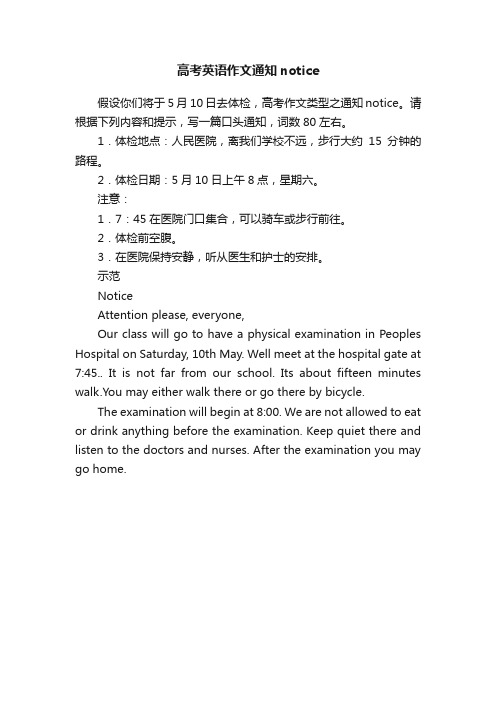
高考英语作文通知notice
假设你们将于5月10日去体检,高考作文类型之通知notice。
请根据下列内容和提示,写一篇口头通知,词数80左右。
1.体检地点:人民医院,离我们学校不远,步行大约15分钟的路程。
2.体检日期:5月10日上午8点,星期六。
注意:
1.7:45在医院门口集合,可以骑车或步行前往。
2.体检前空腹。
3.在医院保持安静,听从医生和护士的安排。
示范
Notice
Attention please, everyone,
Our class will go to have a physical examination in Peoples Hospital on Saturday, 10th May. Well meet at the hospital gate at 7:45.. It is not far from our school. Its about fifteen minutes walk.You may either walk there or go there by bicycle.
The examination will begin at 8:00. We are not allowed to eat or drink anything before the examination. Keep quiet there and listen to the doctors and nurses. After the examination you may go home.。
高考英语书面表达系列之通知

高考英语书面表达系列之通知1. 口头通知一、掌握口头通知特点口头通知即以口头的形式表达通知的内容,其特点是:用词较口语化,句子不会太复杂,通常只需用一段话讲清其内容即可。
另外,口头通知的开头和结尾通常都有一定的固定套语,同学们也应特别注意。
二、妥用口头通知呼语口头通知的开头称呼语通常需根据听众的具体情况来确定,有时还要考虑其场合是否正式。
如在比较正式且男女听众兼有的场合,通常用Ladies and gentlemen 来称呼听众,同时注意该表达的词序,不要想当然地将其倒过来,且一定要用复数。
当然,若听众中只有男士,则只用Gentlemen;或者只有女士,则只用Ladies。
但是,如果在非正式场合,则比较随便。
对学生用的称呼语通常是Boys and girls。
三、熟记口头通知套语(1) 在用口头下达通知时,发通知者通常要将听通知人的注意力吸引过来,这类表达常见的有:May I have your attention, please?Attention please, everyone. I have an announcement to make.Be quite. There is something important I have to tell you.I have something (important) to tell you.I’m glad to tell you something important.(2) 其他用于口头通知的固定套语(如叫听者不要迟到、欢迎某人参加某活动等):Everyone is asked to be there on time.Be sure not to be late.Please be present on time.Please take your notebooks with you and be sure on time.Those who are interested in it are warmly welcome.(3) 口头通知的结束套语主要有:That’s all. Thank you very much.四、牢记口头通知时态口头通知是要告诉大家即将进行的活动,因此要以一般将来时为主。
高中英语书面表达【通知】模板

通知通知有口头和书面通知。
书面通知讲究格式,语言简练,用词贴切,必须要写清楚时间、地点和活动。
通常用一般现在时态和将来时态。
1.口头通知常用称呼语:Dear classmates/schoolmates,Ladies and gentlemen,同学们/女士们,先生们Boys and girls,同学们。
2.常用开头语:Attention,please.请注意。
May l have your attention,please?请注意。
I have good news for you all.有个好消息要告诉大家。
I have an announcement to make.有个通知要告诉大家。
Please be quiet,everyone!I have something important to tell you.Attention,please!I have something important to tell you.(仅用于口头通知)请安静,我要告诉你们一件事情。
3.常用句型:1.There is going to be/We are are gong to2.Whoever is interested can contact…..3.There is sure to be a lot of fun.everyone is welcome.4.Looking forward to your participation.4.范文:Boys and girls,Attention, please! I have an announcement to make.We are going to visit the Science Museum tomorrow. We will meet at the school gateat eight in the morning and we will go there on foot. Take your pens and notebooks with you. We should listen and watch carefully and write down something interesting when we visit the museum. Please don’t make any noise in the museum and don’t take any pictures. You’ll have to hand in a report about the visit next Monday.Thank youNOTICEWe are going to have an English-speaking contest for our students in order to improve their oral English and create a better environment for speaking English. It will be held at room 1 on the 5th floor in the teaching building at 9:00 am, Dec. 24th. The first three winners will be given prizes. We will have five English teachers and a student representative as judges.We are inviting you to come to our contest as a judge and we will be very honored if you could come to help us.Students' Union欢迎您的下载,资料仅供参考!致力为企业和个人提供合同协议,策划案计划书,学习资料等等打造全网一站式需求。
高考英语书面表达通知写法汉服展示活动

⑤ Everyone is welcomed to take part in it.
⑥ Welcome everyone who is willing to … / is
interested in it.
⑦ Those who are interested in … are warmly
welcome.
二、书面通知
书面通知,即以书面的形式表达通知的内容。书面通知 一般篇幅短小,言简意骇。
1. 书面通知格式: (1)标题。 在正文的正上方上写 Notice或大写NOTICE。 (2)正文。即通知的内容。 (3)通知发布日期。写在正文的左下角(在落款的下一行) 或右上角(在notice的下一行)。 (4)通知发布单位。一般写在正文后的右下角。
四、常用语块
1. 出席
be pre_s_en__t _(a_t_)_(_b_e _ab_s_en_t_f_ro_m缺席 )
2. 表达某人的观点 _e_x_p_r_e_s_s_o_n_e_’__s_o_p_i_nion
3. 选择某人作为……___c_h_o_o_s_e_s_b_._a_s_…___
4. 参加
For the sake of promoting our friendship, there will be a get-together this afternoon.
十、结尾套语
① If you have a question about…, please do not
hesitate to contact…
② Please contact …at 12345 for further information.
③ Those who want to take part in the contest,
高考英语应用文写作之通知

注意:
1. 词数不少于50。
2. 可适当增加细节,以使行文连贯
3. 开头和结尾已给出,不计入总词数
Hello, everybody! May I have your attention, please? _____________________________________________ ________________________
4.书面通知格式模板: Notice 1st.April,2017
In order to ________, ________ is to be held on ________ (day), ________ (date), at ________ (time)in ________ (place). Whoever is interested in it is welcome to attend ________. Those who want to take part in ________ please sign up at the Student Union.
Students' Union
Please remember: ________________.
Students’ Union
5.口头通知格式模板: Ladies and gentlemen,
Your attention ,please . I have something to tell you. 具体内容:
__________________________________________________ __________________________________________________ __________________________________________________ __________________________________________________
高考英语怎样写通知

通
知
• 一、口头通知:
• 1.一般是由当事负责人口头传达的通知。它不如 书面通知那么正规。正文叙述尽量口语化,简明 扼要,把事情说清楚就行了。 • 2. 口头通知形式简单,无须通知时间 和发出通知 的单位,直接进行叙述,注意开头结尾的常用语。 口头通知可以带有称呼,如“Boys and girls; Teachers and fellow students; Comrades and friends, Ladies and gentlemen”等。亦可不用 称呼,直接开始。为了提醒注意,开头常用
“
Attention, please; I have something important to tell you! Here’s an announcement, please listen to me! ” 3、通知叙述完毕后,常用“That’s all, thank you”等以表示礼貌。 4、口头通知一般采用第一人称或第二人称。
审
题
1. 本文为口头通知,应注意使用相应 的开头语和结束语 2.时态以现在时为主。 列要点:根据英文提示列出汉语要点
通知开头语 1)_____________________________
a).May I have your attention? /Attention
b).have an announcement to make / have something importa通知一般是上级对下级组织对其成 员部署工作传达事情或召开会议所使用的 一种文体。常以布告形式张贴或写在布告 牌上黑板上; 把事情通知到有关人员如学生、 教师、会员、读者、听众、观众等。 2). 书面通知一般篇幅短小,语言简洁明了。 一般只需说明何事、何地、何时、何人即 可。 3). 格式:(l) 通知正文上面正中地方往往写 上 "Notice ( 或NOTICE)一词。
高考英语通知类作文写作模式及范文

高考英语通知类作文写作模式及范文高考英语通知分为口头通知和书面通知,一般不用写标题,也不必有发通知的日期。
高考英语通知类作文写作常以Ladiesandgentlemen,Boysandgirls等开头;接下来是:Bequiet,please!Attention,please!MayIhaveyourattentionplease!Pleasebequiet,everyone,thereissomethingIhavetotellyou.高三英语作文通知结尾语常用:Anyquestions?Doeseveryoneunderstand?That’sall.Thankyou.1高考英语口头通知范文请根据下面提示写一篇口头通知:假如你是学生会主席,你要在学校广播上发布通知,内容如下:学生会将在八月十五日晚(星期六)主楼报告厅举办聚会,欢迎来自美国的朋友。
聚会7:00准时开始。
节目有音乐、舞蹈、唱歌比赛。
最好还要和外国朋友交换礼物。
请带上自己的礼物,写上自己的名字和祝福语。
1.要点:a.学生会将在八月十五日晚(星期六)主楼报告厅举办聚会,欢迎来自美国的朋友。
b.聚会7:00准时开始。
c.节目有音乐、舞蹈、唱歌比赛。
最好还要和外国朋友交换礼物。
d. 请带上自己的礼物,写上自己的名字和祝福语。
2.单词和短语的选择:begoingtobeheld/begoingtoholdaparty;Therewillbe…..;bring…along…;wrapup;sig nyournameandwrite…;3.注意开头和结尾:Boysandgirls,MayIhaveyourattention,please?Ihaveannouncementtomake.TheStud entUnionisgoingtoholdapartyonSaturdayevening,August15.TowelcomeourfriendsfromtheStates,thepartywillbeheldinthelecturehalloftheMainBuilding.Itwillbeginat7:00p.m.Therewillbemusic,dancing,singingandexchangeofgifts.Willeveryonepleasebri ngalongasmallgiftforthispurpose.Remembertowrapitup,signyournameandwriteafew wordsofgoodwishes.Don`tforgetthetime.Thereissuretobealotoffun.Everyoneiswelcome.That`sall.Thankyou.1书面通知写作范文内容如下:1.你们学校为了提高中生的口语水平,将于10月2号下午在教学楼一楼报告厅举行英语口语竞赛2.愿意参加的同学在9月25号前在学生会报名。
高考英语作文通知
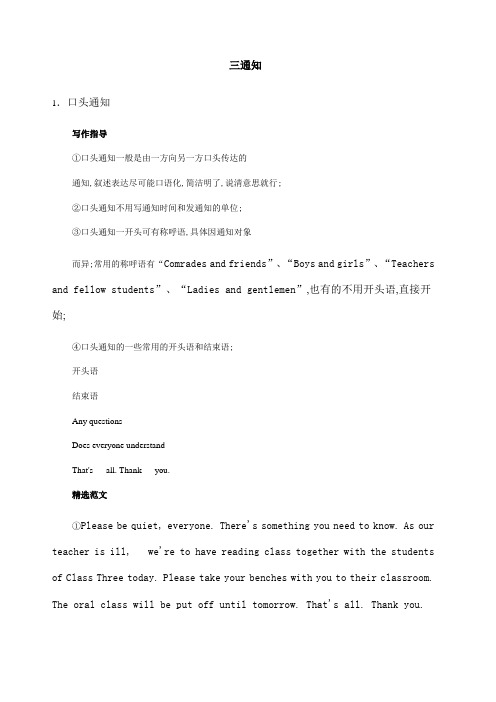
三通知1.口头通知写作指导①口头通知一般是由一方向另一方口头传达的通知,叙述表达尽可能口语化,简洁明了,说清意思就行;②口头通知不用写通知时间和发通知的单位;③口头通知一开头可有称呼语,具体因通知对象而异;常用的称呼语有“Comrades and friends”、“Boys and girls”、“Teachers and fellow students”、“Ladies and gentlemen”,也有的不用开头语,直接开始;④口头通知的一些常用的开头语和结束语;开头语结束语Any questionsDoes everyone understandThat's all. Thank you.精选范文①Please be quiet, everyone. There's something you need to know. As our teacher is ill, we're to have reading class together with the students of Class Three today. Please take your benches with you to their classroom. The oral class will be put off until tomorrow. That's all. Thank you.②Attention please, comrades. There is going to be a talk on American Family in the Lecture Hall this afternoon. It'll be given by an American professor _____ Mr. Smith. Those who want to attend please be there at 2∶30 Any question If no, that's all. Thank you.③Listen, please, I have something important to tell you. We're going to hold a get-together with some foreign students at 7∶00 p. m. on Friday in the Foreign Student's Dining Hall. Any one who wants to take part in it, please be there on time. Thank you.④Ladies and gentlemen, Listen, please. This afternoon we're going to visit the Great Wall, the bus will stop at the foot of the Great Wall. Three hours later, we'll get together here and back to the hotel. When you go to visit the Great Wall, please take your valuable things with you. And remember to come back to the bus at five o'clock. Do be there on time.Does everyone understandSince everyone understands very well.Thank you.练习①假如你是班长,利用课余时间告诉你的同班同学,本星期六下午4∶00在本班教室召开班会,主题是:如何保持教室干净、整洁;请同学们准备好发言;字数:60~80左右参考词语将……四处扔to throw…about对……危害to do harm to吐痰to spit保持……干净go keep…clean准备好to get ready for②假如你是学生会主席,通知各班团支部书记今天下午4∶30在会议室开会,讨论本学期打算开展哪些活动等事宜;字数:60左右参考词语讨论……活动 to discusse …activities团支书the secretaries of League Branch出席to be present③假如你是班上的体育委员,你班下星期一准备和6班进行一场篮球赛;请非队员的同学到时到学校篮球场观看,为本班球队喝彩助威;字数:60左右参考词语参加比赛to take part in the match应邀to be invited to喝彩助威to cheer up篮球场basketball court④假如你是语文课代表,通知全班同学,因语文老师生病,请假2天,这两天的语文课改上自习,完成练习册第52页上的练习,另外预习好第16课课文;字数:60~80左右参考词语请两天假to ask for two days leave自学to study by ourselves⑤假如你是生活委员,通知学生今天下午第七节课进行大扫除;分工情况:男同学整理桌凳,打扫墙壁,女同学擦门窗、桌凳等;同学们按照自己的分工情况带好工具;字数:60~80左右参考词语进行大扫除to have a general clean-up分成to be divided into扫把broom抹布mop⑥假如你是英语课代表,通知你班同学今天上午第三节课到学校语音室上英语口语课,请同学们带好口语课本,另外在语言实验室要遵守规则,不得损坏设备,否则是要被罚款的;字数:60左右参考词语语言实验室language lab遵守规则to keep the rules of…损坏设备to damage the equipment罚款to fine⑦假如你是班长,请通知学生听一个访美报告,时间是12月20日下午3点,地点为205会议室,主讲人是刚访美归国的李明华教授;内容:美国中学教育;每个同学各带一至二名外校学生参加,要求不要迟到,本年级同学会后留下来讨论;字数:60~80左右参考词语美国中学教育American high school education允许to be allowed to do something期望be expected to进行讨论to have a discussion⑧假如你是班长,通知你班同学本周星期六晚上7∶30在本班教室举行一次英语晚会,节目有唱歌、朗诵、讲故事、话剧等,要求本班同学都参加,欢迎外班同学光临,请同学们作好准备;字数:80左右参考词语朗诵recitation节目programme 或program欢迎to be welcomed表演to perform2.书面通知写作指导书面通知、布告notice,它是上级对下级、组织对成员部署工作、传达事情、召开会议所使用的一种文体,出通知的单位写在正文结束后的右下角,或者写在NOTICE的正上方,出通告的日期一般写在左下角,单位和日期两项也可以省略;通知的正文就是通告的内容,这是主体部分,包括通告的对象、事由、时间、地点等;通知的语言要简洁明了,条理清晰,要求精确,特别是时间概念很重要,必须写得十分明确,不容丝毫含糊;精选范文①NoticeAll the classes of our grade are ready to play basketball matches next week. We'll play three matches every other three days to see which ones will take the three positions in the name list. At the same time abasketball will be given to each of these classes as a reward. On behalf of代表 our school thechampionwill have a basketball match against a team of some other brother school. All the students are welcomed to watch the matches.Senior Two ②NoticeTomorrow is our National Planting Day. To answer the call “plant trees everywhere and make our country green.” We decided to plant trees on March 12. All the students in our school should take part in the activity. The boy students of each class must bring hoes锄头and spades铁锹,and the girl students must bring buckets桶 and watering pots. We are going to gather at the playground at half past seven. And then we'll go to the place by bike. Every one is requested to go withoutspecial reasons.The Headmaster's Office March 11, 2000③The Headmaster's Office NoticeAll the teachers and teaching staff教工are requested to meet in the meeting hall on Fridayat 2∶30 . to study some papers on education. Aug 23,2000.练习①通知兹定于2007年4月6日星期一下午第二节课在第二教学大楼307教室高三2班举行英语公开课,由王先生主讲,希望全体英语教师出席,热烈欢迎其他组的老师参加;教务处2007年4月4日字数:60左右参考词语公开课an open class第二教学大楼the second Teaching Building参加to attend②学校图书馆通知本学期快结束了,图书馆要搬到新楼,借此机会,在暑假期间清理书籍,请凡在图书馆借了书的师生在本月月底将书归还给图书馆,谢谢大家合作;字数:50左右参考词语同时at the same time计划to plan to清理分类to sort out向……借to borrow…from…归还to return to到……底 by the end of③学校团委通知定于5月4日星期五组织青年教师及各班班长、团支书参观历史博物馆,凡愿意去的老师请于5月4日早上于7∶00到校门口集合,乘车前往;2007.5.2字数:50左右参考词语青年节the Youth Day安排to be arranged for历史博物馆the History Museum集合to gather校团委The School League Committee ④学校办公室通知为了迎接“教师节”,学校准备开会庆祝,校长将要在会上讲话,表彰三好学生和先进班级、优秀教师,各班还准备了精彩的节目;时间:12月30日下午两点星期六地点:学校大礼堂希望全体师生准时到会;字数:80左右参考词语庆祝to celebrate教师节Teachers Day三好学生the three-good student先进班级the advanced class模范教师model teacher受表彰to be commended学校大礼堂the auditorium hall⑤写防火通告发现火警须知要点:a.打电话报警b.离现场,勿返取物C.走楼梯,不坐电梯d.住旅馆先找安全出口处字数:100左右参考词语火警the fire alarm被……困住to be trapped by乘电梯to take the lift随身携带to take…with一……就as soon as⑥某中学将有一位美国教授布莱克博士来访,该教授将给师生们作一次报告,介绍美国的教育情况;学校要求同学们在星期三下午2∶30准时到105大教室参加报告会,并带上笔记本,以便会后讨论;请你根据上面要点,用英语写一通知;字数:80左右参考词语美国教授American professor有关教育的报告a report on the education作笔记to take notes讨论to have a discussion⑦学校体育教研组的通知;包括以下内容:a.因连日下雨,本周星期六的运动会不得不延期举行,星期六上午照常上课,下午不上课;如果天气情况良好,运动会将于下周星期六上午举行;b.校篮球队队员请于本周星期六下午3点半到室内篮球场集训,上海来的篮球明星将给予辅导;通知时间:2007年10月18日字数:80左右参考词语体育教研组teaching group of physical education辅导coach运动会the sports meeting推迟to put off被要求to be required像往常一样 as usual允许to permit⑧兹定于星期五下午2∶00在我校会议室召开高三年级全体教师讨论会,请该年级的全体教师准时出席;校长办公室1999年6月10日字数:50左右参考词语被要求to be requested to高三年级the Senior Grade Three⑨迁址公告中国日报上海办事处和上海英文星报从1999年8月8日始,将迁往新址:上海市万航渡路395号邮编:200042各部门如下电话号码不变:办公室:总编室:采编部:广告部:发行部:传真:参考词语迁移removal办事处bureau采编部news desk发行部circulation3.广播通知写作指导广播通知Broadcast Announcement并不是一种正式文体,但应用甚广,在我们同外宾、外商交往中,经常会通过广播通知各项事宜,所以,这里把它专列一项,仅供参考;精选范文①飞机误点通知Late Arrival of a planeAnnouncementListen, please, Flight London International Airline 137 from London will be an hour later because of the bad weather.②飞机发动机发生故障的通知Engine Trouble of a planeAnnouncementAttention, please. Flight AF Air Frame 208 from Paris is overdue误点 because of engine trouble. It's stopping in Hong Kong for checking up. Further news will be announced.③飞机起飞后的通知Attention, please. Welcome on board, ladies and gentlemen. You're now on board Flight 702 bound for Paris. The flight will take three hours. The time of arrival is 7∶00 . Will you please fasten your seat belts for take-off And Nosmoking during the take-off. Thank you…Now you can unfasten your seat belts. We're now flying at a speed of 845 kilometres an hour and an altitude of 7800 metres. If you would like to read, there are newspapers and magazines in the plane. Thanks.④飞机着陆通知AnnouncementYour attention, please. The plane flying in or about to and is Flight FOAC France Overseas Airways Corporation 376 from Paris, due at 15∶27 hours.练习①旅客们请注意,由北京方向来的68次列车,由于路上碰到事故,将要晚点1小时到达;字数:30左右参考词语事故accident②旅客同志请注意,第53次快车即将离站,开往长沙方向,请大家赶快上车,这是最后一次广播;字数:30左右参考词语快车express开往depart for最后一次广播final call③旅客同志们请注意,从伦敦方向来的英国国际航空公司的第207次班机,将于14点20分准点着陆;字数:30左右参考词语准点due at着陆land英国国际航空公司British Overseas Airways Corporation航班flight④根据以下内容写一份广播通知稿,以便你在你校“校园广播”中宣读:注意:a.短文的语句要连贯,条理要清楚,内容要全面;b.词数80左右;C.不要逐条翻译;d.开头已经给出,请接下去写;Boys and girls,May I have your attention, please …题目/飓风及其危害参考词语飓风及危害the hurricane and its damage从……学到……to learn…from…叫龙卷风的电影a film called“Twister”出席讲座to attend the lecture随身带to bring…with…三通知1. 口头通知①Fellow students, Attention, please I have something to tell you. Recently some students throw their waste paper about. And some students spit freely. Our classroom is too dirty. This does harm to our health. So at four o'clock on Saturday we're going to have a class meeting. The topic is "How to keep our classroom clean and tidy" . Those students want to speak, please get ready for your speech.That's all. Thank you②Please be quiet, every one. There is something you should know. The following is an anouncement of the Student Union. We're going to have an important meeting to discuss what activities we' re going to havethis term at 4:30 this afternon in the meeting room. The secretaries of League Branch of all classes are requested to be present on time.May I have your attention, please There is something you need to know. To make our life lively, therewill be a basketball match between our class and classsix at 3:00 next Monday. Those who won' t take part in the match are invited to watch the match to cheer up our team at our school basketball court.That' s all. Thank you.④Listen, please I have something to tell you. Our Chinese teacher Mr Smith is ill. He has asked for two days' leave. We have to study by ourselves, finishing all the exercises on Page 52 on the workbook and preparing lesson sixteen. You are to finish the exercises before Mr Smith comes back.That's all. Thank you.⑤Attention, please. I have something to tell you. This afternoon, in the third lesson, we are going to have a general clean-up in our classroom. We are divided into two groups----boys and girls. Boys are to tidy allthe desks and benches, the walls and the ceilings. Girls are to clean the desks and benches, windows and doors. And to save time, some of the boys should bring brooms, and some of the girls should bring some mops. Do remember it.That's all. Thank you.⑥Follow students, Attention, everyone. I have something important to tell you. The third class of this morning, we' re going to have an English oral lesson in the language lab. Please take your oral books with you. And you' re asked to keep the rules of the lab. Never damage the equipment. Otherwise you' ll be fined. That's all. Thank you.⑦Listen, please. There will be a talk on American high school education from 3:00 to 4:30 in the afternoon of December 20th in the Meeting Room 205. The talk will be given by Professor Li Minghua. He has just come back from the U. S.Every student is allowed to bring one or two students from other schools for the talk. Please don' t be late.After the talk, all the students in our grade are expected to stay and have a discussion.That's all. Thank you.Fellow students, attention, please. I have somegood news to tell you. We're going to have an English evening, in our classroom at 7:30 on Saturday evening. The programme includes songs, recitations, storytelling and short plays. Everyone in our class must take part in it and students from other classes are also welcome. Everyone who takes part in the party should perform once.That's all. Thank you.2.书面通知①TEACHING AFFAIRS OFFICENoticeAn open English class will be given by Mr Wang to Class 2 Senior Ⅲ on April 6th, 1999, in the second class in the afternoon, in Room 307 of the Second Teaching Building. All English teachers are expected to attend the class. Teachers of other groups are welcome.April 4th, 1999②NoticeThe term is ending, the summer vacation is coming. Our school library is moving to a new building and at the same time, we are planning to sort out the books. All the teachers and students who borrowed books from the library should return them to the library by the end of this month.Thank you.The school libraryJune 25, 1999③NoticeTo spend the Youth Day meaningfully, a visit is arranged for May 4th, Friday, to the History Museum.Those young teachers, monitors and League Branch Secretaries of all classes who wish to go will gather at the school gate. The bus will leave at 7:00 a. m. sharp.The School League CommitteeMay 2nd, 1999④NoticeIn order to celebrate Teachers' Day, a meeting isto be held at the meeting hall on Saturday, Dec. 30at2:00 p. m. Our head-master will speak at the meeting. The three-good students and advanced classes and model teachers will be commended too. Wonderful performances will be also given for celebration.The School OfficeDec. 28, 1999⑤Fire NoticeIf you discover a fire:Break the glass to sound the fire alarm. Telephone the operatr; say where the fire is. Leave the hotel by the nearest exit.If you hear the fire alarm:Don' t go to your room to collect your things or you may be trapped by the fire.Don't take the lift, as the lift may become trapped between floors. Use the stairs.Leave the building at once.Consider every fire alarm to be a real fire.Take your room key with you. If you are trappedby fire in the building, you may have to return to your room .Find out where the nearest fire exit is as soon as you arrive at your hotel.⑥NoticeAn American professor, Dr Black will visit our shcool this Wednesday afternoon. He will give us a report on the education in America. Everyone is supposed to be in Room 105, the big classroom exactly at2:30 . Wednesday. Please bring your notebooks with you and take notes while listening to the lecture, so that we can have a discussion about it after it is over.The Headmaster's Office⑦Teaching Group of Physical EducationNoticeA. As it has been raining all these days, the sports meeting of this Saturday has to be put off . All students are required to come to school on Saturday morning as usual, but there will be Noclass that afternoon. If weather permits, the sports meeting will be held next Saturday morning.B. Players of the school basketball team are to be trained at the basketball hall at 3:30 p. m. this Saturday. Some famous basketball stars from Shanghai will coach you in your training. Please be there on time.Oct. 18th, 1999⑧NoticeAll the teachers of the Senior Grade Three are requested to meet in the meeting room of our school to have a meeting to discuss the problems of the Senior Grade Three on Friday, at 2:00 p. m.Jun. 10, 1999The Headmasters'Office⑨REMOVAL NOTICEPlease note as of Sunday August 8, 1999, China Daily Shanghai and Shanghai Star will move to the following address:No. 395 Wanhangdu Road, ShanghaiPost code : 200042Telephone numbers:3. 广播通知①Attention, please. The Train 68 from Beijing willbe arriving an hour later. Because it has met with an accident.②AnnouncementPassengers, your attention, please. No. 53 Express is departing for Changsha. All the passengers get on the train, please. This is final call.③AnnouncementYour attention, please. The plane flying in is Flight BOAC British Overseas Airways Corporation 207 f rom London, due at 14:20.④Boys and girls.May I have your attention, please A lecture on “The Hurricane and its Damage” will be given from 8:10 to 10:00 in the morning of Nov. 20. It will be given in Room 402 of our school library by Li Hua who is a geography teacher. I' m sure you will learn a lot from it. After the lecture, there will be an American film called “Twister” .Please attend the lecture on time and bring a notebook with you.That's all. Thank you.。
高考英语书面通知写作模板

Notice 英文书面通知写作Step 1:书面通知特征和格式:Step 2:如何审题Step 3:What to write and How to write写作模板:NoticeIn order to_____________________________________________【活动目的】, the... activity will be held by our school students’ union . Here are some relevant details about it.【过渡句】It will be conducted in....【时间,地点】There will be various /diverse activities, including singing, ...dancing and so on.【活动具体内容】What’s more, you need to be informed of the following requirements. Please___________________________.Remember______________. You are expected _______________________________________.【活动要求或注意事项】Those who want to take part in it please sign up at the Student Union.【介绍参加人员】We sincerely hope that you will not miss the chance and wish you have a wonderful time.【表达欢迎参加】The Students’ Union日期Step 3:Related Expressions1.口头通知开头:寒暄语1)Ladies and gentlemen/Boys and girls, may I have your attention, please!2)Attention, please! I have an announcement to make.3)Be quiet, please! There is something important I have to inform you.书面通知寒暄语:1)On behalf of the Student’s Union,I inform you of sth.2)Representing the Student’s Union, I inform you that clause.2.活动目的:1)...to do...; ...in order to...; ...so as to...;...with the purpose/intention of...2)aim to do sth; intend to do sth3)...in order that/so that...4)...activity will be held, which enables sb to do sth{活动目的}5)...activity will be held, v-ing (作结果状语)丰富课外生活:enrich/diverse students’after-class/extracurricular activities;Make...diverse/various亲近自然:get close to...;expose yourself closely to...3.活动举行)The activity will be held/launched/organized/hosted/arranged2)There will be a/an...activity held/launched.3) schedule/arrange sb to do sth; invlove sb in sth (活动)4.活动地点和时间:1)The activity will start/begin/be launched at...o’clock on Saturday morning and end at...o’clock.2)We will set off at...o’clock on Saturday morning and won’t come back at...3)The activity will start/begin/be launched at...o’clock and it will last...hours.4)The activity is due to begin....地点和时间整合表达:The activity will be held in +地点...on+时间....1)The activity will be organized in the school hall on Saturday evening, August 15.2)As scheduled, this activity is to be held in the lecture hall from 2:30 to 4:00 in the afternoon on June 9 th,2019.5. 活动要求1)Here are the significant requirements of which you need to be informed. (总起句)2)Please do sth; Remember to do sth; Keep sth in mind; You are expected/required to do sth; You are supposed to do sth; You might as well do sth;6.介绍活动内容:There will be various /diverse activities, including/containing/like singing, ...dancing and so on.7.介绍参加人员We sincerely hope everyone can attend it.All the teachers and students are required to attend it.Those who want to take part in it please sign up at the Student Union.Those who are interested in the activity are welcome.参加活动: sb be (actively) invloved in sth; sb participate in sth; sb be engaged in sth.报名:sb sign up; enter for sth(活动)8.表达欢迎积极参加(结尾)1)We sincerely hope that you will not miss the chance and wish you have a wonderful time.。
书面通知和口头通知英语作文
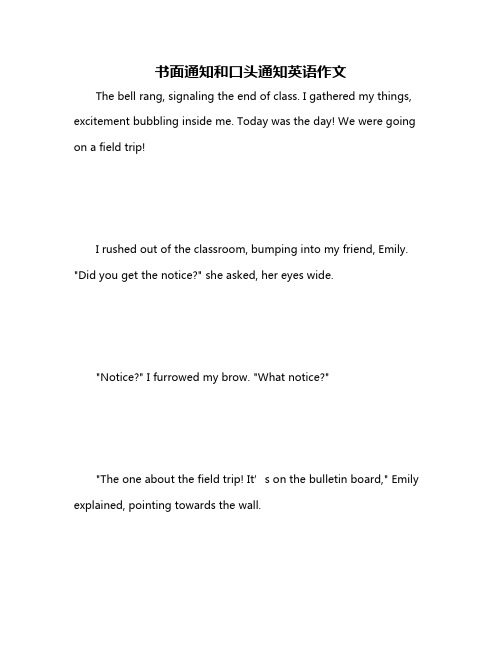
书面通知和口头通知英语作文The bell rang, signaling the end of class. I gathered my things, excitement bubbling inside me. Today was the day! We were going on a field trip!I rushed out of the classroom, bumping into my friend, Emily. "Did you get the notice?" she asked, her eyes wide."Notice?" I furrowed my brow. "What notice?""The one about the field trip! It’s on the bulletin boar d," Emily explained, pointing towards the wall.My heart sank. I hadn't seen the notice. I had been so busy daydreaming about the trip that I completely missed it. Now, I didn't know anything!"It's okay," Emily said, squeezing my hand. "My mom told me about it. We're going to the science museum!"The science museum! I loved dinosaurs!Suddenly, a voice boomed behind me. "Everyone! Gather around for important announcements!"Mr. Jones, our teacher, stood at the front of the class, a huge grin on his face. "We're going on a field trip to the science museum next week!""Yes!" I shouted, jumping up and down. I had missed the notice, but Mr. Jones had told us all about it.I felt a little silly for not reading the notice, but the excitement of the trip overwhelmed any disappointment. I knew it was going to be a fantastic day.。
英语作文:书面通知+口头通知

2017届高考英语作文专题:通知【写作指导】通知可分为书面通知和口头通知两种。
书面通知可采用布告形式或书信形式; 口头通知要求比较灵活,语言简明扼要。
结构:第一层:事件简要信息第二层:事件详细信息,活动过程,活动须知第三层:结束语书面通知:1. An English evening party intended to deepen mutual understanding between us and international students is scheduled to be held on Friday Evening.2. The party is due to begin at 7:00p.m. in the Lecture Hall, lasting about 3 hours. .3. Each of the students is expected to perform during the evening party. You may tell a story, sing a song, make a speech or read a poem and so on.4.All the teachers and students are welcome to attend our English evening./Everybody is expected to attend it.5.Be sure to attend it on time./Do be present on time./Don’t miss the chance!口头通知:(注意口头通知开头结尾的招呼语)1. May I have your attention, please? In order to get a better understanding of Chinese senior high school life. About sixty Australian students will pay a visit to our school on June 15.2. We’ll meet them at the school gate at 8:30 in the morning, after which, w e’ll take them to themeeting-room, where a get-together will be held to conduct a deep conversation between us.3. After tha t, we’ll show them around our botanical garden and the school-run factory. At11:00 there will bea basketball match on the playground, which is sure to cheer us up.4.Keep in mind that we should be friendly to them and communicate them in English.5. That’s all. Thank you.【经典例句】1. Ladies and gentlemen, may I have your attention, please? I have an _____________ (通知) to make.2. Everybody is __________ (欢迎)/___________ (期望) to be ___________ (出席) at the contest.3. It has been ____________ (决定) to organize a music week.4. There will be a lecture ______ American Culture. / A lecture. will be given/delivered by …. On American Culture.5. The first six winners will be given _______________ (奖项).6. Please listen _____________ (集中注意力) and we'll have a discussion ______groups___________ (follow) the lecture.7. ______ sure (确保) to _______ (出席) it on time.8. Please take your notebooks and _______ _________ (做笔记).9. The meeting _______ (origin) scheduled to be held this Thursday has to be put _____/ postponed until ______ notice.10. Don’t forget to bring your gifts _____ you.11. Please ______________ (确认) your ________________ (participate) at your earliest convenience.12. All teachers __________ (request) to meet in the school meeting room at 4 pm. on Friday ____________ (celebrate) Teachers' Day. Please be there on time.地点的表示方法:___ Room 2,_____ the meeting room, ____ the stadium, ____ the lab, _____ the Friendship Theater, ____ the school gate, ____ the farm _____the second floor,____the playground时间的表示方法(钟点\星期\年\月\日):___ June, 2017 _____ June 7, 2017 ____ Tuesday, June 7, 2017____ 9:00 pm. _____ June 7, 2017 at 5:00 ____ the evening of June 8, 2017_____ 5:00 pm. ____ Wednesday, June 7, 2017 ___ 5:00 ___ Wednesday evening, June 7, 2017____ 5:00 pm. ____8 pm. _____ Wednesday, June 7, 2017动词短语:go h_________(远足) go _____ a tour 去观光have a ________ (野餐)d_________ a speech hold a speech ________ (比赛) ________ (加入) this clubpay _______________ (参观) to the museum _________ (出席到场) the lecturesign ______ _______ 报名参加=enter one’s name for【即学即练】(1)你校学生会举办义卖活动以资助贫困地区儿童上学。
- 1、下载文档前请自行甄别文档内容的完整性,平台不提供额外的编辑、内容补充、找答案等附加服务。
- 2、"仅部分预览"的文档,不可在线预览部分如存在完整性等问题,可反馈申请退款(可完整预览的文档不适用该条件!)。
- 3、如文档侵犯您的权益,请联系客服反馈,我们会尽快为您处理(人工客服工作时间:9:00-18:30)。
(2)过渡语:在做口头通知时,通常要先将听众的注意力吸 引过来,而后再做通知。常使用的过渡句有:
May I have your attention,please? Attention please. I have an announcement(通知、宣布、发言) to make. Be quiet. There is something important I have to tell you./I have something(important)to tell you. /I'm glad to tell you something important. (3)正文。即通知的内容。 (4)结束语。口头通知的结束语通常为:That's all. Thank you.
口头通知
口头通知一般是由一方向另外一方口头传达的通 知,表达要尽可能口语化,简洁明了。
其格式如下: (1)称呼语。称呼语通常需根据听众的具体情况来 确定。
如在比较正式且男女听众兼有的场合,通常用 Ladies and gentlemen 来称呼听众。
如果在非正式场合,则比较随便,可以说Dear friend语报社下周准备举行原创小说 大赛,假设你是学生会长李华,请你代表学生会写一则书面通知 告知学生参与。
主要内容包括:
1.小说必须原创,能反映学生的真实生活,字数500以内 2.作品截止日期:2019年1月30日 3.外教会作为评委 4.获奖者将颁发证书 注意:1. 词数80左右;
Notice
In order to improve the students’ spoken English, an English-speaking contest(among the students of Senior 3) will be held in the school auditorium at seven o’clock p.m. on October 30th,2012. The contest is organized by the Students’ Union. Those who would like to take part in the contest may sign up in the office of the Students’ Union before Oct.,20th. Five English teachers will be invited to work as judges. The first ten winners will be given rewards.
All are welcome to join in the contest.
The Students’ Union
Sep. 10th
Part 1 介绍活动的名称,时间,地点,目的等基本信息。 要求语言简洁,准确。 例:为提升学生的地震安全意识,我校下周三下 午将举行一次地震演习(drill)。 An earthquake drill will be held in our school on Wednesday afternoon next week to improve everyone’s awareness of earthquake safety.
2. 可以适当增加细节,以使行文流畅。
通知
Notice
高
中 英
Notice
语 书 面 表 达
之 口头通知
与 书面通知
通知作为应用文的一种,也是常考的题型。 通知通常用来把有关事情告诉特定的读者或听 众。通知的正文就是通告的内容,是主体部分 ,包括通告的对象、事由、时间、地点等。
一般分为口头通知和书面通知两种。
1.标题。书面通知要在正文的正上方写上Notice 或大写NOTICE。
2.正文。即通知的内容。
3.落款。书面表达要表明出通知的时间和单位名 称。书信式通知的日期可写在右上角;布告式通知的 时间一般放在正文的左下角,要低于落款(单位名称)。
写作指导
1.通知写作应注意的问题。
(1)书面通知较之口头通知所使用的句式要复杂些 。书面通知可以将若干的信息通过一个句子表达出来 ,而口头通知则可以分为几个句子表达。
(4)为避免命令之嫌,通知中常采用被动语态或 “please+祈使句”表示要求。
如:All teachers are required to meet in the school meeting room at 4 pm on Friday to celebrate Teachers' Day.
Please be there on time.
Beginning
口头通知: 1. Hello, everybody/everyone. 2. Ladies and gentlemen. 3. May I have your attention, please? I have an announcement to make. 请注意,好吗?我要通知一件事情。 4. Attention, please! I have something important to tell you. 请注意!我有重要的事情要告诉你们。
参照模板
A.口头通知 Dear classmates,
May I have your attention, please? There is going to be…
Please attend it on time. That’s all. Thank you.
书面通知
书面通知又称为通告或布告(Notice),是部署工作 、传达事情、召开会议所使用的一种文体。其格式如 下:
例:请准时到会。
口头:Be sure not to be late.
书面:Everyone is required to be present on time.
(2)通知的语言要简明,条理清晰,要求明确,特 别是时间概念很重要,必须写得十分明确,不容丝毫 含糊。
(3)通知是要告诉大家即将进行的活动,因此其主 要时态是一般将来时。
